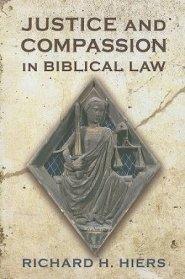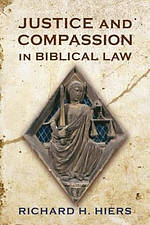There is a received wisdom that the God encountered in the Old Testament is somewhat less enlightened that the nice God of the New Testament. Marcion may be the most famous early proponent of this idea, but it has persisted in the church (and outside) ever since.
Richard Hiers sees in the Old Testament legal system a rich source of ethics, and one which is commonly overlooked. He does not seek to suggest that Old Testament law can be simply applied into modern day life, but he does suggest that it provides a useful framework for critiquing modern values. In doing this, he traces the development of the law over time (he assumes a period of development of 600 - 700 years).
In undertaking this task, Hiers groups the law into three broad ares: Civil Law (contract, tort and inheritance); Criminal Law (trials, impartiality of judgment, capital offence, protection for the accused); and a miscellany of laws which might be categorised as Social Legislation. In doing this, he asserts that justice and compassion go hand in hand.
The bulk of the book is taken up with the discussion sketched out above, and each chapter is detailed and clearly argued as befit an author who is both a Professor of Religion and an Affiliate Professor of Law. He concludes that the Biblical legal ethic provides a strong counter argument against (post)modern relativism and self interest and that, contrary to the assumptions of a liberal society, the Old Testament has much to commend it.
Trustpilot











